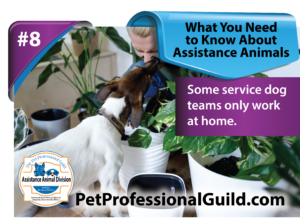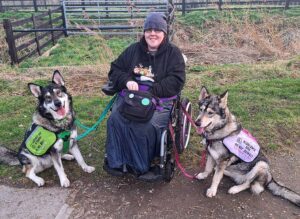Pets and Their People Blog
Perceptions of Assistance and Service Dogs by the General Public
Stereotypes of Assistance and Service Dogs
Based on seeing stereotypes of assistance and service dogs, many people expect these dogs to be Labradors working under charities like Guide Dogs.
It is becoming more common to see assistance and service dog teams owner train rather than seeking help from a charity for an assistance dog. Charities may not be an option due to the wait times and also the cost, which is outside the budget for so many teams. Today, assistance dogs come in all sorts of breeds, from all sorts of backgrounds – including rescue.
Due to this current trend not being widely known and the media not often portraying it, the general public is not always aware that dogs of all breeds can be assistance and service dogs.

What Can You Do to Help?
Learning about the varying kinds of assistance dogs is really easy. And today there are so many wonderful Internet resources on the different breeds and backgrounds of assistance and service dogs, such as Facebook groups and pages. You can even see videos of these teams in action!
Raising awareness with friends and family and explaining that all breeds can be assistance and service dogs can be really helpful to the community of teams so that there is less likelihood of the team being challenged and/or accused of having a fake assistance or service dog.
This isn’t to say of course that some people don’t take advantage of the community, but at times honest owner-trained assistance and service dog teams are sadly challenged and refused access to businesses, services and made to feel like they have done something wrong in public for not having a known breed. For some teams, the humans can suffer with PTSD, anxiety or a condition where conflict can cause them distress and trigger an episode.
You, as one person, could make a huge difference in accessibility for assistance and service dog teams by spreading the word.
And each time you spread the word, another person will become more knowledgeable and also be able to spread the word, leading to a knock-on effect of a safer environment for teams all over the world!
About the Author

Tasha Attwood is a force-free dog trainer and behaviorist in Lincolnshire, UK. Very passionate about force-free training and methods, Tasha has trained four dogs, a hedgehog, and a rabbit to expert titles with trick titles -and two bearded dragons currently at novice trick title level -to not only enrich their lives but prove that force-free training can be done with any species. As a wheelchair user, Tasha absolutely loves to show training tutorials to demonstrate how dogs can be trained despite limitations.
- Learn more at: http://www.muttsnmischief.com
- Follow on Facebook: https://www.facebook.com/Miyagisdogtrainingandbehaviouristservices/
- Access free tutorials: https://www.youtube.com/@miyagisdogtraining
- Join a free support group for force-free owners and professionals all over the world, to learn, share their videos, ask for advice and for a community of support from like-minded people: https://www.facebook.com/groups/miyagisdogtrainingcommunity
About the Pet Professional Guild (PPG) Assistance Animal Division
Our volunteer committee includes a broad representation of pet professionals with a variety of skills and interests specific to assistance animals. We invite individuals and professional organizations interested in training, working with, and receiving support from animals who assist people in different ways to join PPG. Pet guardians can join for free, and as members will have access to additional pages on our website (along with some amazing vendor discounts). We look forward to welcoming you into an inclusive group that prioritizes humane treatment and welfare of both people and assistance animals!
